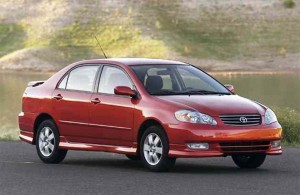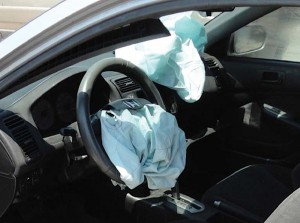Concluding the vehicles may still be unsafe, Toyota Motor Corp. is recalling 1.6 million vehicles equipped with Takata airbags that had been involved in an earlier recall.
The move echoes what happened at Nissan Motor Co. where a passenger was injured when a Takata airbag deployed improperly in a crash. That vehicle had also been involved in an earlier recall. There have been no reports of injuries involving the Toyota vehicles.
The new Toyota recall covers 22 different models, including the popular Corolla, sold in Japan, as well as several European markets. No vehicles in the U.S. are involved in the new service action, though Takata airbags have so far led to the recall of nearly 20 million vehicles sold in the States.
Millions more have been targeted by safety regulators around the world. Toyota alone has so far recalled 15 million vehicles due to the problem with airbag inflators provided by Takata, including 3 million in the U.S.
(After long decline, U.S. highway traffic deaths rising again. Click Here for the latest.)
At least eight people in the States alone have been killed by defective Takata airbags. On rare occasions, they over-inflate when triggered, sending metal and plastic shrapnel spewing into the passenger compartment.
While a precise cause of the problem has yet to be determined, it appears linked to the explosive ammonium nitrate compound Takata uses to inflate its airbags when they’re triggered in a crash. The problem has been considered more likely to occur in high-humidity areas, such as Southern Florida, but has also occurred in drier, cooler climates.
The latest recall suggests Toyota may have tried taking a shortcut in the original Takata recall covering these 1.6 million vehicles. It had dealers check for air leaks and, if none were found, chose not to replace the Takata inflators. It will now change out those parts.
The replacements will also be supplied by Takata, but Toyota has already signed up a second supplier to help it meet demand for substitute inflators, as Takata has had trouble keeping up with the fast-growing pace of airbag recalls.
Toyota also has said it will no longer use Takata as an airbag supplier going forward, as have Nissan and Honda. Ford became the latest to drop the Japanese supplier this past week, even though Takata had promised to find a substitute for the potentially unstable ammonium nitrate it had long used.
(Ford dropping Takata. Click Here for the story.)
The supplier’s problems have only grown worse in recent weeks. Takata this month signed a five-year consider order with the National Highway Traffic Safety Administration requiring it to pay a $70 million fine for delaying action on the exploding airbags.
That penalty could increase to as much as $200 million if the supplier doesn’t abide by all terms of the agreement, including a switch away from ammonium nitrate.
The airbag recalls have so far focused on older vehicles – the latest service action from Toyota covers models manufactured between January 2004 and December 2005 – and only on frontal driver and passenger airbags. But NHTSA is continuing to investigate newer models using Takata inflators, including airbags used in other parts of the vehicle. That was triggered by a report of a serious injury caused when a late-model Volkswagen vehicle’s side-impact airbag misfired during a crash earlier this year.
(Global survey finds strong interest in autonomous vehicles. Click Here to see what Americans said.)


